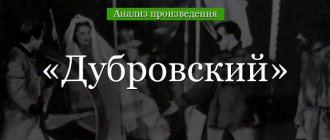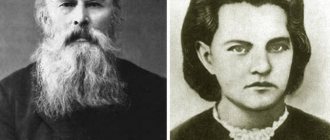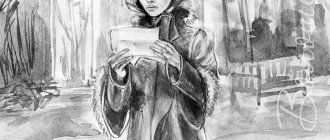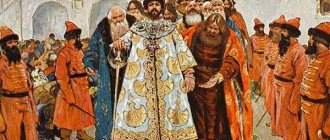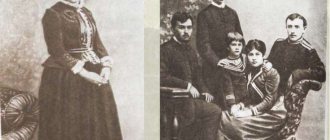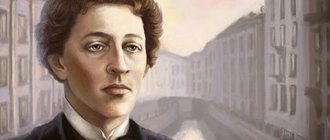Stationmaster
Lev Nikolaevich Tolstoy
Watchmaker
What does a watchmaker do when assembling watches, if he is a master and definitely knows how to make watches? All his fingers are busy: some hold the wheel, others position the axle, others move the gear. He does all this with gentleness, with tenderness. He knows that not only if he rudely shoves one into the other, if even a little clumsily puts one part on, forgetting the other, then everything will fall apart, and it is better for him not to do this thing if he cannot give all his strength. This is why I say this. At first, people live without knowing why, they live only for their own pleasure, which replaces the question for them: “why?” But then the time comes for every intelligent being, he asks: “why?” and receives that answer from Christ that we all know: “to do God’s work.” Is God's work really either less important or less complicated than a watch? Is it really possible to do God’s work head on and everything will work out? In a watch you cannot press on the wrong part, but the defenders of worldly life say: “What is there to disassemble, does not fit into the place, hit it hard with a hammer, it will go right in.” They don't care that everything else gets flattened. They don't even see it. You cannot work on a watch without full attention and, so to speak, love for all parts. Is it really possible to work God’s work like this? It is good to do the work of God from the shoulder (that is, to live not in love with brothers) for someone who does not quite believe that his work is the work of God. But when a person believes that the meaning of his life is only to promote the unification of people, then he cannot help but devote himself entirely to the one whose work he is doing; he can no longer treat all the people with whom he comes into contact without care, attention and love. , because all people are wheels, gears, pins of God’s work. The only difference between a man and a watchmaker is that the watchmaker knows what will come out of all the parts, but a man, doing God’s work, does not know, does not see the external side of the matter. A person is rather an apprentice who supplies, cleans, lubricates and partly connects the components of a watch unknown to him in form, but known to him in essence (good). I want to say that a person who believes that life is the fulfillment of God’s work must develop seriousness, attentiveness, caution in relations with people, such attentiveness in which creaking, violence, breaking are impossible, and everything will always be soft and loving not for his own pleasure, but because this is the only condition under which God’s work is possible. If this condition is not there, then one of two things: either develop this condition, or give up God’s work and not deceive either yourself or others. Just as a watchmaker stops working as soon as he scratches and creaks, so a believer must stop as soon as there is an unloving attitude towards a person, and he must know that, no matter how unimportant this person may seem to him, what is more important is the relationship with this person, while it creaks, there is nothing. And this is so, because man is a necessary wheel in the work of God, and until he enters where he should enter, lovingly, the whole matter has become. Communication between people obliges them to find both in each of them and in themselves the “son of man,” to unite in him, to arouse both in themselves and in him the desire for rapprochement, that is, love. They will say: it is difficult to find this. Just act like a watchmaker: gently, carefully, not for yourself, but for the cause, and it will come by itself. Disconnection occurs only because I want to force the axle into the wrong wheel. If it doesn’t fit one way or another, correct yourself: there is a place for it, it is needed and will come into play. Just as when working on a watch you achieve your goal and master the task not through exertion of strength, but through caution and gentle handling, the same is true in dealing with people. And not exactly the same, but as many times more, how many times a person is more complex and gentle than a clock. It is impossible to develop tentacles long enough to handle people with them. And the longer and therefore thinner these tentacles are, the more powerfully they move people.
Text of the book "The Station Agent"
Alexander Pushkin.
Stationmaster
College Registrar,
Postal station dictator.
Prince Vyazemsky
Who hasn’t cursed the stationmasters, who hasn’t sworn at them? Who, in a moment of anger, did not demand from them a fatal book in order to write into it his useless complaint about oppression, rudeness and malfunction? Who does not consider them monsters of the human race, equal to the late clerks or at least the Murom robbers? Let us, however, be fair, we will try to put ourselves in their position and, perhaps, we will begin to judge them much more leniently. What is a stationmaster? A real martyr of the fourteenth grade, protected by his rank only from beatings, and even then not always (I refer to the conscience of my readers). What is the position of this dictator, as Prince Vyazemsky jokingly calls him? Isn't this real hard labor? I have peace neither day nor night. The traveler takes out all the frustration accumulated during a boring ride on the caretaker. The weather is unbearable, the road is bad, the driver is stubborn, the horses are not moving - and the caretaker is to blame. Entering his poor home, a traveler looks at him as if he were an enemy; it would be good if he managed to get rid of the uninvited guest soon; but if the horses don’t happen?.. God! what curses, what threats will rain down on his head! In the rain and slush, he is forced to run around the yards; in a storm, in the Epiphany frost, he goes into the entryway, just to rest for a minute from the screams and pushes of an irritated guest. The general arrives; the trembling caretaker gives him the last two threes, including the courier one. The general leaves without saying thank you. Five minutes later - the bell rings!.. and the courier throws his travel document on his table!.. Let's look into all this thoroughly, and instead of indignation, our hearts will be filled with sincere compassion. A few more words: for twenty years in a row I traveled across Russia in all directions; I know almost all postal routes; I know several generations of coachmen; I don’t know a rare caretaker by sight, I haven’t dealt with a rare one; I hope to publish a curious stock of my travel observations in a short time; For now I will only say that the class of stationmasters is presented to the general opinion in the most false form. These much-maligned caretakers are generally peaceful people, naturally helpful, inclined towards community, modest in their claims to honor and not too money-loving. From their conversations (which are inappropriately neglected by gentlemen passing by) one can glean a lot of interesting and instructive things. As for me, I confess that I prefer their conversation to the speeches of some 6th class official traveling on official business.
You can easily guess that I have friends from the venerable class of caretakers. Indeed, the memory of one of them is precious to me. Circumstances once brought us closer together, and this is what I now intend to talk about with my dear readers.
In 1816, in the month of May, I happened to be driving through the *** province, along a highway that has now been destroyed. I was in a minor rank, rode on carriages and paid fees for two horses. As a result of this, the caretakers did not stand on ceremony with me, and I often took in battle what, in my opinion, was rightfully due me. Being young and hot-tempered, I was indignant at the baseness and cowardice of the caretaker when this latter gave the troika he had prepared for me under the carriage of the official master. It took me just as long to get used to having a picky servant hand me a dish at the governor’s dinner. Nowadays both seem to me to be in the order of things. In fact, what would happen to us if instead of the generally convenient rule: honor the rank of rank,
something else came into use, for example:
honor the mind of the mind?
What controversy would arise! and who would the servants start serving the food with? But I turn to my story.
The day was hot. Three miles from the station it began to drizzle, and a minute later the pouring rain soaked me to the last thread. Upon arrival at the station, the first concern was to quickly change clothes, the second was to ask myself some tea. “Hey, Dunya! - the caretaker shouted, “put on the samovar and go get some cream.” At these words, a girl of about fourteen came out from behind the partition and ran into the hallway. Her beauty amazed me. “Is this your daughter?” – I asked the caretaker. “Daughter, sir,” he answered with an air of satisfied pride, “she’s so intelligent, so nimble, she looks like a dead mother.” Then he began to copy out my travel document, and I began to look at the pictures that decorated his humble but neat abode. They depicted the story of the prodigal son: in the first, a respectable old man in a cap and dressing gown releases a restless young man, who hastily accepts his blessing and a bag of money. Another vividly depicts the depraved behavior of a young man: he sits at a table, surrounded by false friends and shameless women. Further, a squandered young man, in rags and a three-cornered hat, tends pigs and shares a meal with them; his face shows deep sadness and remorse. Finally, his return to his father is presented; a kind old man in the same cap and dressing gown runs out to meet him: the prodigal son is on his knees; in the future, the cook kills a well-fed calf, and the elder brother asks the servants about the reason for such joy. Under each picture I read decent German poetry. All this has been preserved in my memory to this day, as well as pots with balsam, and a bed with a colorful curtain, and other objects that surrounded me at that time. I see, as now, the owner himself, a man of about fifty, fresh and cheerful, and his long green coat with three medals on faded ribbons.
Before I had time to pay my old coachman, Dunya returned with a samovar. The little coquette noticed at second glance the impression she made on me; she lowered her big blue eyes; I began to talk to her, she answered me without any timidity, like a girl who has seen the light. I offered my father her glass of punch; I served Duna a cup of tea, and the three of us began talking as if we had known each other for centuries.
The horses were ready a long time ago, but I still didn’t want to part with the caretaker and his daughter. Finally I said goodbye to them; my father wished me a good journey, and my daughter accompanied me to the cart. In the entryway I stopped and asked her permission to kiss her; Dunya agreed... I can count many kisses since I’ve been doing this, but not one has left such a long, such a pleasant memory in me.
Several years passed, and circumstances led me to that very road, to those very places. I remembered the old caretaker's daughter and rejoiced at the thought that I would see her again. But, I thought, the old caretaker may have already been replaced; Dunya is probably already married. The thought of the death of one or the other also flashed through my mind, and I approached the station *** with a sad foreboding.
The horses stopped at the post house. Entering the room, I immediately recognized the pictures depicting the story of the prodigal son; the table and bed were in the same places; but there were no longer flowers on the windows, and everything around showed disrepair and neglect. The caretaker slept under a sheepskin coat; my arrival woke him up; he stood up... It was definitely Samson Vyrin; but how he has aged! While he was getting ready to rewrite my travel document, I looked at his gray hair, at the deep wrinkles of his long-unshaven face, at his hunched back - and could not marvel at how three or four years could turn a vigorous man into a frail old man. “Did you recognize me? - I asked him, “you and I are old acquaintances.” “It may be,” he answered gloomily, “there is a big road here; many travelers visited me.” - “Is your Dunya healthy?” – I continued. The old man frowned. “God knows,” he answered. “So, apparently she’s married?” - I said. The old man pretended not to hear my question and continued to read my travel document in a whisper. I stopped my questions and ordered the kettle to be put on. Curiosity began to bother me, and I hoped that the punch would resolve the language of my old acquaintance.
I was not mistaken: the old man did not refuse the offered glass. I noticed that the rum cleared up his sullenness. By the second glass he became talkative; remembered or pretended to remember me, and I learned from him a story that at that time greatly interested and touched me.
“So you knew my Dunya? - he began. – Who didn’t know her? Ah, Dunya, Dunya! What a girl she was! It happened that whoever passed by, everyone would praise, no one would judge. The ladies gave it as a gift, sometimes with a handkerchief, sometimes with earrings. Gentlemen passing by deliberately stopped, as if to have lunch or dinner, but in fact only to take a closer look at her. It used to be that the master, no matter how angry he was, would calm down in her presence and talk kindly to me. Believe it, sir: couriers and couriers talked to her for half an hour. She kept the house going: she kept up with everything, what to clean, what to cook. And I, the old fool, can’t get enough of it; Didn’t I really love my Dunya, didn’t I cherish my child; Did she really have no life? No, you can’t avoid trouble; what is destined cannot be avoided.” Then he began to tell me in detail his grief. Three years ago, one winter evening, when the caretaker was ruling a new book, and his daughter was sewing a dress for herself behind the partition, a troika drove up, and a traveler in a Circassian hat, in a military overcoat, wrapped in a shawl, entered the room, demanding horses. The horses were all in full speed. At this news the traveler raised his voice and his whip; but Dunya, accustomed to such scenes, ran out from behind the partition and affectionately turned to the traveler with the question: would he like to have something to eat? Dunya's appearance had its usual effect. The passerby's anger passed; he agreed to wait for the horses and ordered himself dinner. Taking off his wet, shaggy hat, unraveling his shawl and pulling off his overcoat, the traveler appeared as a young, slender hussar with a black mustache. He settled down with the caretaker and began to talk cheerfully with him and his daughter. They served dinner. Meanwhile, the horses arrived, and the caretaker ordered that they immediately, without feeding, be harnessed to the traveler’s wagon; but, when he returned, he found a young man almost unconscious lying on a bench: he felt sick, had a headache, it was impossible to go... What to do! the caretaker gave him his bed, and it was supposed, if the patient did not feel better, to send to S*** for a doctor the next morning.
The next day the hussar became worse. His man went on horseback to the city to get a doctor. Dunya tied a scarf soaked in vinegar around his head and sat down with her sewing by his bed. In front of the caretaker, the patient groaned and said almost a word, but he drank two cups of coffee and, groaning, ordered himself lunch. Dunya did not leave his side. He constantly asked for a drink, and Dunya brought him a mug of lemonade she had prepared. The sick man wet his lips and each time he returned the mug, as a sign of gratitude, he shook Dunyushka’s hand with his weak hand. The doctor arrived at lunchtime. He felt the patient’s pulse, spoke to him in German and announced in Russian that all he needed was peace and that in two days he would be able to hit the road. The hussar gave him twenty-five rubles for the visit and invited him to dinner; the doctor agreed; They both ate with great appetite, drank a bottle of wine and parted very pleased with each other.
Another day passed, and the hussar completely recovered. He was extremely cheerful, joked incessantly, first with Dunya, then with the caretaker; he whistled songs, talked with passers-by, wrote down their travel information in the postal book, and became so fond of the kind caretaker that on the third morning he was sorry to part with his kind guest. The day was Sunday; Dunya was getting ready for mass. The hussar was given a wagon. He said goodbye to the caretaker, generously rewarding him for his stay and refreshments; He said goodbye to Dunya and volunteered to take her to the church, which was located on the edge of the village. Dunya stood in bewilderment... “What are you afraid of? “- her father said to her, “after all, his honor is not a wolf and will not eat you: take a ride to the church.” Dunya sat down in the wagon next to the hussar, the servant jumped onto the handle, the coachman whistled, and the horses galloped off.
The poor caretaker did not understand how he could allow his Duna to ride with the hussar, how blindness came over him, and what happened to his mind then. Less than half an hour had passed when his heart began to ache and ache, and anxiety took possession of him to such an extent that he could not resist and went to mass himself. Approaching the church, he saw that the people were already leaving, but Dunya was neither in the fence nor on the porch. He hastily entered the church: the priest was leaving the altar; the sexton was extinguishing the candles, two old women were still praying in the corner; but Dunya was not in the church. The poor father forcibly decided to ask the sexton whether she had attended mass. The sexton replied that she had not been. The caretaker went home neither alive nor dead. There was only one hope left to him: Dunya, in the frivolity of her young years, perhaps decided to take a ride to the next station, where her godmother lived. In painful anxiety he awaited the return of the troika on which he had let her go. The coachman did not return. Finally, in the evening, he arrived alone and drunk, with the murderous news: “Dunya from that station went further with the hussar.”
The old man could not bear his misfortune; he immediately went to bed in the same bed where the young deceiver had lain the day before. Now the caretaker, considering all the circumstances, guessed that the illness was feigned. The poor man fell ill with a severe fever; he was taken to S*** and someone else was assigned to his place for the time being. The same doctor who came to the hussar also treated him. He assured the caretaker that the young man was completely healthy and that at that time he still guessed about his evil intention, but remained silent, fearing his whip. Whether the German was telling the truth or just wanting to show off his foresight, he did not console the poor patient in the least. Having barely recovered from his illness, the caretaker asked S*** the postmaster for leave for two months and, without telling anyone a word about his intention, he set off on foot to fetch his daughter. From the road station he knew that Captain Minsky was traveling from Smolensk to St. Petersburg. The driver who was driving him said that Dunya cried all the way, although it seemed that she was driving of her own accord. “Perhaps,” the caretaker thought, “I’ll bring my lost sheep home.” With this thought in mind, he arrived in St. Petersburg, stopped at the Izmailovsky regiment, in the house of a retired non-commissioned officer, his old colleague, and began his search. He soon learned that Captain Minsky was in St. Petersburg and lived in the Demutov tavern. The caretaker decided to come to him.
Early in the morning he came to his hallway and asked him to report to his nobility that the old soldier was asking to see him. The military footman, cleaning his boot on the last, announced that the master was resting and that he would not receive anyone before eleven o’clock. The caretaker left and returned at the appointed time. Minsky himself came out to him in a dressing gown and a red skufia. “What do you want, brother?” - he asked him. The old man’s heart began to boil, tears welled up in his eyes, and in a trembling voice he said only: “Your Honor!.. do such a divine favor!..” Minsky looked at him quickly, flushed, took him by the hand, led him into the office and locked him behind him. door. “Your Honor! - continued the old man, - what fell from the cart was lost; at least give me my poor Dunya. After all, you were amused by her; Don’t destroy her in vain.” “What has been done cannot be undone,” said the young man in extreme confusion, “I am guilty before you and am glad to ask you for forgiveness; but don’t think that I could leave Dunya: she will be happy, I give you my word of honor. Why do you need it? She loves Me; she was unaccustomed to her previous state. Neither you nor she will forget what happened.” Then, putting something down his sleeve, he opened the door, and the caretaker, without remembering how, found himself on the street.
He stood motionless for a long time, and finally saw a bundle of papers behind the cuff of his sleeve; he took them out and unfolded several crumpled five- and ten-ruble notes. Tears welled up in his eyes again, tears of indignation! He squeezed the pieces of paper into a ball, threw them on the ground, stamped his heel and walked away... After walking a few steps, he stopped, thought... and turned back... but the banknotes were no longer there. A well-dressed young man, seeing him, ran up to the cab driver, sat down hastily and shouted: “Get off!..” The caretaker did not chase him. He decided to go home to his station, but first he wanted to see his poor Dunya at least once again. For this purpose, two days later he returned to Minsky; but the military footman told him sternly that the master did not accept anyone, pushed him out of the hall with his chest and slammed the doors in his face. The caretaker stood, stood, and then went.
On this very day, in the evening, he walked along Liteinaya, having served a prayer service for All Who Sorrow. Suddenly a smart droshky raced in front of him, and the caretaker recognized Minsky. The droshky stopped in front of a three-story house, right at the entrance, and the hussar ran onto the porch. A happy thought flashed through the mind of the caretaker. He returned and, drawing level with the coachman: “Whose horse, brother? - he asked, “isn’t it Minsky?” “Exactly so,” answered the coachman, “what do you want?” - “Well, here’s the thing: your master ordered me to take a note to his Dunya, and I’ll forget where his Dunya lives.” - “Yes, right here, on the second floor. You are late, brother, with your note; now he’s with her.” “There’s no need,” the caretaker objected with an inexplicable movement of his heart, “thanks for the advice, and I’ll do my job.” And with that word he walked up the stairs.
The doors were locked; he called, several seconds passed in painful anticipation. The key rattled and it was opened for him. “Is Avdotya Samsonovna standing here?” - he asked. “Here,” answered the young maid, “why do you need it?” The caretaker, without answering, entered the hall. “You can’t, you can’t! - the maid shouted after him, “Avdotya Samsonovna has guests.” But the caretaker, without listening, walked on. The first two rooms were dark, the third was on fire. He walked up to the open door and stopped. In the beautifully decorated room, Minsky sat thoughtfully. Dunya, dressed in all the luxury of fashion, sat on the arm of his chair, like a rider on her English saddle. She looked at Minsky with tenderness, wrapping his black curls around her sparkling fingers. Poor caretaker! Never had his daughter seemed so beautiful to him; he couldn't help but admire her. "Who's there?" – she asked without raising her head. He remained silent. Receiving no answer, Dunya raised her head... and fell onto the carpet screaming. Frightened Minsky rushed to pick her up and, suddenly seeing the old caretaker at the door, left Dunya and approached him, trembling with anger. “What do you want? - he said to him, gritting his teeth, - why are you sneaking after me everywhere like a robber? or do you want to stab me? Go away!" - and, with a strong hand, grabbing the old man by the collar, he pushed him onto the stairs.
The old man came to his apartment. His friend advised him to complain; but the caretaker thought, waved his hand and decided to retreat. Two days later he set out from St. Petersburg back to his station and again took up his post. “For three years now,” he concluded, “I have been living without Dunya and there is neither a word nor a breath of her. Whether she is alive or not, God knows. Stuff happens. Not her first, not her last, was lured away by a passing rake, but he held her there and abandoned her. There are a lot of them in St. Petersburg, young fools, today in satin and velvet, and tomorrow, look, they are sweeping the street along with the tavern's nakedness. When you sometimes think that Dunya, perhaps, is disappearing right away, you will inevitably sin and wish for her grave...”
This was the story of my friend, the old caretaker, a story repeatedly interrupted by tears, which he picturesquely wiped away with his lap, like the zealous Terentyich in Dmitriev’s beautiful ballad. These tears were partly aroused by the punch, of which he drew five glasses in the continuation of his story; but be that as it may, they touched my heart greatly. Having parted with him, I could not forget the old caretaker for a long time, I thought for a long time about poor Duna...
Recently, driving through the town of ***, I remembered my friend; I learned that the station over which he commanded had already been destroyed. To my question: “Is the old caretaker alive?” – no one could give me a satisfactory answer. I decided to visit a familiar side, took free horses and set off for the village of N.
This happened in the fall. Gray clouds covered the sky; a cold wind blew from the reaped fields, blowing red and yellow leaves from the trees they encountered. I arrived in the village at sunset and stopped at the post office. In the entryway (where poor Dunya once kissed me) a fat woman came out and answered my questions that the old caretaker had died a year ago, that a brewer had settled in his house, and that she was the brewer’s wife. I felt sorry for my wasted trip and the seven rubles spent for nothing. “Why did he die?” – I asked the brewer’s wife. “I got drunk, father,” she answered. “Where was he buried?” - “Outside the outskirts, near his late mistress.” - “Is it possible to take me to his grave?” - “Why not? Hey Vanka! You've had enough of messing around with the cat. Take the master to the cemetery and show him the caretaker’s grave.”
At these words, a ragged boy, red-haired and crooked, ran out to me and immediately led me outside the outskirts.
- Did you know the dead man? – I asked him dear.
- How can you not know! He taught me how to carve pipes. It used to be (may he rest in heaven!) he would come out of a tavern, and we would follow him: “Grandfather, grandfather! nuts!” - and he gives us nuts. Everything used to mess with us.
– Do passers-by remember him?
- Yes, but there are few travelers; Unless the assessor wraps it up, he has no time for the dead. In the summer, a lady passed by, and she asked about the old caretaker and went to his grave.
- Which lady? – I asked curiously.
“Beautiful lady,” answered the boy; - she rode in a carriage of six horses, with three little barchats and a nurse, and a black pug; and when they told her that the old caretaker had died, she began to cry and said to the children: “Sit still, and I’ll go to the cemetery.” And I volunteered to bring it to her. And the lady said: “I know the way myself.” And she gave me a silver nickel - such a kind lady!..
We came to the cemetery, a bare place, unfenced, dotted with wooden crosses, not shaded by a single tree. I have never seen such a sad cemetery in my life.
“Here is the grave of the old caretaker,” the boy told me, jumping onto a pile of sand into which was buried a black cross with a copper image.
- And the lady came here? – I asked.
“She came,” answered Vanka, “I looked at her from afar.” She lay down here and lay there for a long time. And there the lady went to the village and called the priest, gave him money and went, and gave me a nickel in silver - a nice lady!
And I gave the boy a penny and no longer regretted either the trip or the seven rubles I spent.
Stationmaster :: Pushkin Alexander Sergeevich
--------------- Pushkin, Alexander Sergeyevich
Stationmaster
A.S. Pushkin
Complete works with criticism
STATION GUARD
Collegiate registrar, Postal station dictator
Prince Vyazemsky.
Who hasn’t cursed the stationmasters, who hasn’t sworn at them? Who, in a moment of anger, did not demand from them a fatal book in order to write into it his useless complaint about oppression, rudeness and malfunction? Who doesn’t consider them monsters of the human race, equal to the late clerks or, at least, the Murom robbers? Let us, however, be fair, we will try to put ourselves in their position, and perhaps we will begin to judge them much more leniently. What is a stationmaster? A real martyr of the fourteenth grade, protected by his rank only from beatings, and even then not always (I refer to the conscience of my readers). What is the position of this dictator, as Prince Vyazemsky jokingly calls him? Isn't this real hard labor? I have peace neither day nor night. The traveler takes out all the frustration accumulated during a boring ride on the caretaker. The weather is unbearable, the road is bad, the driver is stubborn, the horses are not moving - and the caretaker is to blame. Entering his poor home, a passer-by looks at him as if he were an enemy; it would be good if he managed to get rid of the uninvited guest soon; but if the horses don’t happen?.. God! what curses, what threats will rain down on his head! In the rain and slush, he is forced to run around the yards; in a storm, in the Epiphany frost, he goes into the entryway, just to rest for a minute from the screams and pushes of an irritated guest. The general arrives; the trembling caretaker gives him the last two threes, including the courier one. The general leaves without saying thank you. Five minutes later - the bell rings!... and the huntsman throws his travel bag on his table!.. Let's look into all this carefully, and instead of indignation, our hearts will be filled with sincere compassion. A few more words: for twenty years in a row, I traveled Russia in all directions; I know almost all postal routes; I know several generations of coachmen; I don’t know a rare caretaker by sight, I haven’t dealt with a rare one; I hope to publish a curious stock of my travel observations in a short time; For now I will only say that the class of stationmasters is presented to the general opinion in the most false form. These much-maligned caretakers are generally peaceful people, naturally helpful, inclined towards community, modest in their claims to honor and not too money-loving. From their conversations (which are inappropriately neglected by gentlemen passing by) one can glean a lot of interesting and instructive things. As for me, I confess that I prefer their conversation to the speeches of some 6th class official traveling on official business. You can easily guess that I have friends from the venerable class of caretakers. Indeed, the memory of one of them is precious to me. Circumstances once brought us closer together, and this is what I now intend to talk about with my dear readers. In 1816, in the month of May, I happened to be driving through the *** province, along a highway that has now been destroyed. I was in a minor rank, rode on carriages, and paid fees for two horses. As a result of this, the caretakers did not stand on ceremony with me, and I often took in battle what, in my opinion, was rightfully due me. Being young and hot-tempered, I was indignant at the baseness and cowardice of the caretaker when this latter gave the troika he had prepared for me under the carriage of the official master. It took me just as long to get used to having a picky servant hand me a dish at the governor’s dinner. Nowadays both seem to me to be in the order of things.

